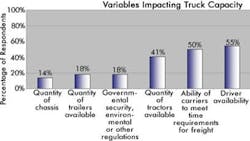"Shipping goods across the U.S. has always had, and will continue to have, shippers scratching their heads over which mode of transportation is the most efficient and cost effective," says Bruce Tompkins, executive director of the Supply Chain Consortium, an organization providing benchmarking and best practices knowledge. Based on a recent study of rail and truck capacity, the Consortium's survey participants expect significant shifts in transportation modes.
Many companies anticipate major increases in rail usage, Tompkins notes. "Parcel shippers should also notice more business coming their way, and companies will begin to increase their use of inbound consolidation as a means of reducing the cost of transportation. On the other hand, the survey reveals that air freight will trend downward, and truck transportation is expected to stabilize, with little movement either way."
A majority of survey respondents are making some level of changes in truck usage, Tompkins reports, either from less-than-truckload (LTL) to the less-expensive truckload mode, or to the even more economical (and of course, slower) railroads. Truck usage is restricted by several factors, he notes, with the main variables impacting truck capacity being: limitations for certain destinations and the backhaul and empties returns opportunities; driver availability in some regions; and equipment availability.
Variables Impacting Truck Capacity (% of Respondents)
See Also
About the Author
Dave Blanchard
Senior Director of Content
Focus: Supply Chain
Call: (941) 208-4370
Follow on Twitter @SupplyChainDave
During his career Dave Blanchard has led the editorial management of many of Endeavor Business Media's best-known brands, including IndustryWeek, EHS Today, Material Handling & Logistics, Logistics Today, Supply Chain Technology News, and Business Finance. He also serves as senior content director of the annual Safety Leadership Conference. With over 30 years of B2B media experience, Dave literally wrote the book on supply chain management, Supply Chain Management Best Practices (John Wiley & Sons, 2010), which has been translated into several languages and is currently in its second edition. He is a frequent speaker and moderator at major trade shows and conferences, and has won numerous awards for writing and editing. He is a voting member of the jury of the Logistics Hall of Fame, and is a graduate of Northern Illinois University.
